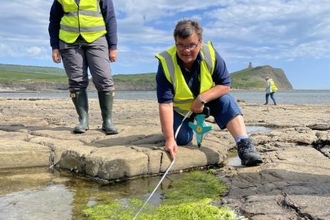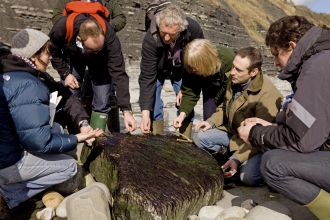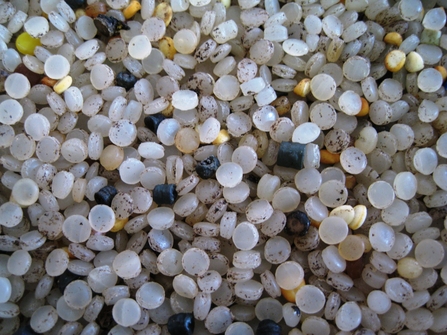Urgent Appeal: Save Our Wild Seas
If we don't act now, there could be more plastic than fish in the sea by 2050
Can you imagine a sea so full of plastic that every fish and every seabird has plastic in its stomach? A world where there is more plastic in the sea than fish?
If we don't act now, this could become reality for Dorset's coast and marine wildlife.
Donate to our urgent appeal and you will be powering work to stop plastic destroying our seas and the wonderful wildlife living there. Your donation could provide equipment to help remove deadly litter from our coast, or fund essential camera equipment to monitor the effects of pollution on seals and more wildlife.
Your donation will help our seas survive, and our marine wildlife thrive.
Did you know?
157 marine species of conservation concern are found in and around Dorset's seas.
Up to 53 billion nurdles enter our oceans each year.
90% of the UK’s seagrass meadows have been lost to pollution, disease and disturbance.
How your donation will help
£50
could provide equipment to help remove deadly marine litter from Dorset's coastline
£100
could buy kits for Wild Seas Surveyor volunteers to capture essential data
£250
could fund education to inspire people from all backgrounds to take action for our marine environment
Why is urgent action needed?
As a society, we rely on plastics every day, including single-use plastics. An estimated twelve million tonnes of plastic finds its way into our oceans every year. Plastic’s durability and slow degradation mean this problem isn’t going anywhere soon, and marine wildlife is suffering as a consequence.
If plastic keeps entering the sea at this rate, there could be more plastic than fish in the sea by 2050. We need to prepare for this outcome and start protecting wildlife and the marine environment from plastic pollution now.
What are nurdles?
Nurdles are very small pellets of raw plastic which are transported around the world for use in the manufacture of plastic products.
Because they are so small and light, they can easily find their way into the sea, whether lost in transit or washed down the drain in factories. They are microplastics: so small that it is very difficult to filter them out.
At our Fine Foundation Wild Seas Centre at Kimmeridge Bay, a Nurdle-O-Meter keeps track of how many nurdles have been collected by volunteers - a recent running total counted 500,000 nurdles removed from the bay. But millions more remain in the marine environment, where they will enter the food chain.

Emma Godden
How does plastic hurt marine wildlife?
Marine wildlife comes face-to-face with our plastics habit every day. That might mean eating plastic, not only by accident when hunting, but also through microplastics in the food chain. Plankton and other small marine creatures eat microplastics, passing them up the chain to the small fish and crustaceans that eat plankton – and then to larger fish and birds. When plastic accumulates in the stomachs of fish and birds, it can be fatal.
But it’s not just plastic in the stomach that threatens marine wildlife. Discarded plastics including shopping bags, packaging, nets and ropes can trap marine wildlife of all sizes. They can catch, cut or strangle species like seals, dolphins and porpoises (all found around Dorset’s coastline) with disastrous, deadly consequences.
What about pollution?
Pollution of other kinds also poses a significant threat to marine wildlife. Toxic chemicals and oil from road runoff and spills find their way into the sea, threatening the health of wildlife as well as the health of the overall marine habitat.
Algae blooms caused by excess nitrates in sewage and agriculture runoff can suffocate the vital seagrass meadow habitats that support many species of fish and seahorses.
The Poole Harbour oil spill earlier this year saw 200 barrels of contaminated fluid including oil leak into an internationally important, designated Site of Special Scientific Interest on our doorstep. The long-term effects on the molluscs, fish, marine mammals and birds in and around the harbour remain to be seen.
But I’ve already reduced my use of plastics.
This is a step that we all need to take to ensure the safety of our marine wildlife in the years to come. Sadly, even if we all stopped using plastic tomorrow, marine wildlife would still feel the effects of the tonnes of plastic already in the sea for many years. That’s why we need your help to really understand and start addressing the problem here in Dorset, through research, monitoring, advocacy and action.
We urgently need to raise £25,000 to fund work to protect and monitor Dorset’s precious marine wildlife, clear up the pollution on our shorelines, educate people about the need to reduce their use of single-use plastic and influence future policies and decisions about our seas. We must train volunteers in new survey techniques, buy specialist equipment, and develop materials to inspire even more people to care for the future of our seas. There has never been a more critical time for the future of our seas.
Where does my money go?
Protecting the marine environment has been a key focus of Dorset Wildlife Trust for over 60 years and we won't stop until Dorset's wild seas are thriving. To ensure impact and outcomes are high, we keep our plans flexible and scalable. In addition to this public appeal, we are seeking funding from other sources, including grant making organisations. Overall, we need to raise around £100,000 per year to fund our marine conservation work. If we exceed our target of £25,000, we'll be less reliant on other sources of unrestricted funding this year. Alternatively, should we fall short of the target, we have a diverse mix of funding sources which ensure financial security.
Donate to save our wild seas
Nurdles at Kimmeridge Bay (https://youtu.be/nmDOgNyMTM4)
Julie Hatcher, Marine Awareness Officer, tells us all about nurdles and how many of these plastic pellets have already been collected at the Fine Foundation Wild Seas Centre at Kimmeridge Bay.
We are an island nation. Our past and future is intimately connected to the health of the ocean.Sir David AttenboroughBBC Wild Isles



